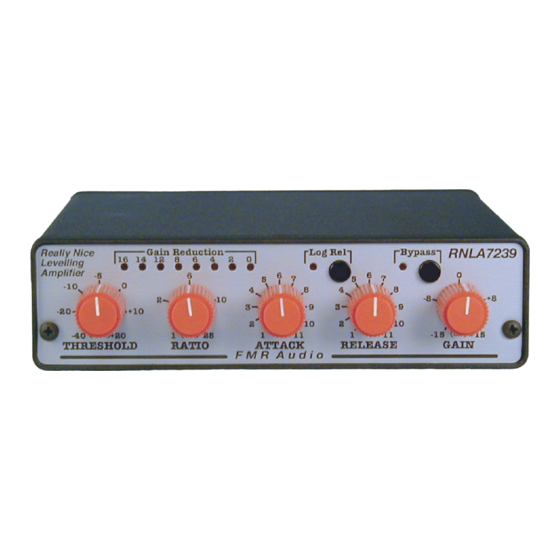
Advertisement
Quick Links
Advertisement

Summary of Contents for FMR Audio RNLA7239
- Page 1 RNLA7239 Really Nice Levelling Amp Quickstart Guide V0.50...
- Page 3 I appreciate you putting your trust and hard-earned cash into one of FMR Audio’s products (or at least giving us a shot by demoing them)! Even though all of us here at FMR Audio are very proud of our prod-...
- Page 4 N T R O D U C T I O N This is the Really Nice Levelling Amplifier (RNLA) Quick Start Guide. The purpose of this document is to: • Describe the history and overall features of the FMR Audio RNLA • Summarize the general features of the RNLA •...
- Page 5 FMR Audio, +1-512-280-6557 www.fmraudio.com 2) It allows us to call the RNC/RNLA by names that are as distinct as the sounds they produce. The RNC was designed to be somewhat neutral while the RNLA was designed to deliberately color the sound.
- Page 6 FMR Audio, +1-512-280-6557 • Balanced Outputs — The RNLA has balanced, non-differential outputs. Although the “cold” part of the signal is not driven (that would be a “differential” signalling scheme), the impedance in both legs are the same, thereby giving your audio the benefit of reduced noise if the RNLA is connected to a balanced line...
- Page 7 FMR Audio, +1-512-280-6557 www.fmraudio.com here in beautiful Austin, Texas ‘cause: (a) We live here. We’re control freaks. We need things done to standards that are very specific and loftier than most. Manu- facturing products here help control important costs and reduce waste (there’s more to producing a product than just considering the costs of labor and parts).
- Page 8 FMR Audio, +1-512-280-6557 new tricks: I’m actually learning to like and find uses for the sonics of the RNLA! • The RNLA has freakin’ Red Knobs — Proof, once again, that there’s “no accounting for taste”, I specified these knobs after a word-association game with my therapist.
-
Page 9: Initial Settings
FMR Audio, +1-512-280-6557 www.fmraudio.com tion, use the appropriate connectors to mechanically make the connection. For example, if you’re connecting to a destination device with a XLR input connector, then use a 1/4”TRS-to-XLRM cable that passes the TIP signal to XLR pin #2, the RING signal to XLR pin #3 and the SLEEVE to XLR pin #1. -
Page 10: Learning More
FMR Audio, +1-512-280-6557 • Adjusting the RELEASE control — If you want less compressor action overall, use a slower RELEASE by turning it CW. If you want more coloration, use a faster RELEASE by turning it CCW. • Using the LOG REL control — Engage this function (LOG REL light is illumi- nated) when you want more “pop”... - Page 11 FMR Audio, +1-512-280-6557 www.fmraudio.com 5) Use Different Compressors — Use as many different types and brands of com- pressors, hardware and software, that you can. If your focus is to improve your recording chops, this will come in handy for meeting yours or your client’s needs.
-
Page 12: Control Description
FMR Audio, +1-512-280-6557 Figure 1: RNLA Front Panel Controls Really Nice Gain Reduction Log Rel Bypass RNLA7239 Levelling Amplifier (dBu) (x:1) (dB) THRESHOLD RATIO ATTACK RELEASE GAIN F M R A u d i o Control Description Threshold — This control sets the input signal amplitude at which the RNLA will start com- pressing. - Page 13 FMR Audio, +1-512-280-6557 www.fmraudio.com Control Description Log Rel — This push button invokes either the default, “normal” mode or a mode with an increased release curve acceleration. When compressing a fair amount (6dB or more), transient signals can get “swallowed”, “ducked” or over-compressed. By changing the release character- istics under higher gain reduction amounts, the “punchy”...
- Page 14 FMR Audio, +1-512-280-6557 Figure 2: RNLA Rear Panel Connections Left Right Sidechain (or Mono) Power Tip = In Tip = In Tip = In 9VAC Ring = Out Ring = Out Ring = Out 500mA Control Description Left Channel Input — This 1/4” connector accepts unbalanced, single-ended output signals from other devices.
- Page 15 FMR Audio, +1-512-280-6557 www.fmraudio.com Table 1: RNLA Specifications Size 1/3 x 1 EIA rack unit Connectors Left/Right 1/4“ unbalanced inputs (TS, or TRS for console inserts) Left/Right 1/4“ balanced, single-ended outputs TRS sidechain Controls & Displays Rotary: Threshold, Ratio, Attack Time, Release Time, Output Level...

Need help?
Do you have a question about the RNLA7239 and is the answer not in the manual?
Questions and answers